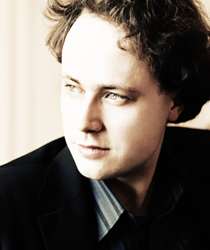|
Back
Debut of Music and Musician New York
Zankel Hall, Carnegie Hall
12/05/2011 -
Johann Sebastian Bach: English Suite No. 3 in G Minor, BWV 808;
Johannes Brahms: Ballade in B Major, Op. 10 No. 4
Adrian Sieber: Fantasie II – ...und schon verglüht (World Premiere)
Franz Schubert: Sonata in B-flat Major, D. 960
Alexander Schimpf (Pianist) 
A. Schimpf (© Balázs Böröcz/Pilvax Studio)
I guess it’s an American thing, but the Cleveland International Piano Competition stated twice in the program that their $50,000 First Prize was “one of the largest cash awards offered by any international competition in the world.”. After these two observations, the names of the judges were listed….almost incidentally.
Along with the cash goes “a New York recital debut”, which was given, with great satisfaction by First Prize Winner Alexander Schimpf, a young German who has already released one record, and obviously has a decent career ahead of him.
Yet is was patently unfair that I should attend his concert less than 48 hours after hearing one of the most singular concert artists in the world, Jeremy Denk. Yes, both artists began their recital with works by Bach. The difference, though, was between a well-proportioned mannequin and an actor of Shakespearean dimensions.
Denk was the latter, his Bach being not exactly pure, but given with theatrical aplomb, conveying emotions fit for the Steinway, not Johann’s little clavier.
Mr. Schimpf played the Third English Suite with all the respect it deserved. Mr. Schimpf was not looking for feelings extraneous to Bach’s dances. His own fingers danced around the gigue and courante, without headlong speed but hardly loosening up on the tempo. The sarabande was far from mournful, and the other movements showed a lucid, conservatively colorful playing.
The idea of playing the final Brahms Ballade by itself was a questionable one. The opening is a philosophical poem, the last one, played here, should be the reverential balance to close the set. Mr. Schimpf offered an almost motionless prayer, and a lovely middle, but it seemed sadly isolated.
Not so two works by the young German composer Adrian Sieber. For the first time last night, one was gripped not only by the playing but the originality of the composition. Mr. Sieber’s first work, Fantasie II, beginning with mysterious rumbles in the bass, blossomed into what was described as a “free passacaglia” It did roam from scale to scale, and was not that easy to follow. But Mr. Schimpf performed it with translucent clarity. One longs to hear this a second time–and to hear the first Sieber fantasy as well.
The second of Sieber’s works, ...und schon verglüht (...and already in embers) was short–all too short. In about four minutes, Mr Sieber had written a work which skirted around a tempestuous waltz, ranging far from the waltz theme then giving hints until an ending far too early.
I had never heard of the composer before, but obviously his is a name to be reckoned with.
The Schubert B Flat Sonata was most satisfactory. It was played slowly–the first movement repeat was taken, Mr. Schimpf paused whenever he felt necessary, yet he has a faultless technique, and the 40 minutes were both eloquent and edifying.
Harry Rolnick
|